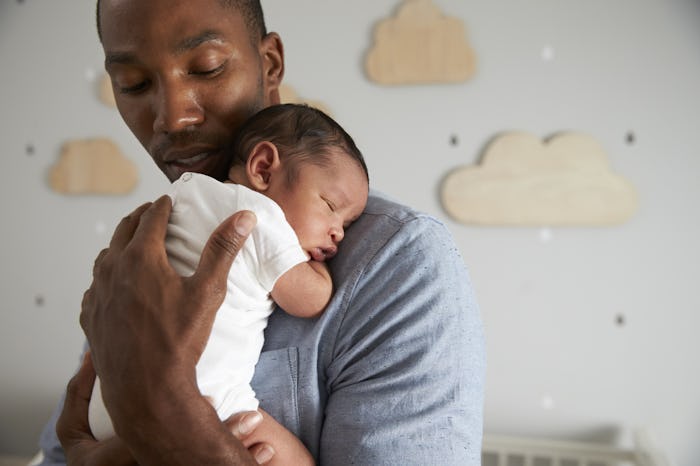Life

What Happens In A Man's Brain When He Has A Son Is More Surprising Than You Think
I will never understand what it's like to become a father. I imagine it is as central to one's own existence as motherhood, but colored by a different set of expectations and desires. When my husband and I first learned that I was pregnant, we were both overjoyed, incandescent. When we found out we were expecting a boy, it was as though something in my husband settled, allowing him to shift into his role as father. There must be at least five things that happen in a man's brain when they have a boy that mostly go unexpressed or unnoticed by the conscious mind, but what could they possibly be?
Researchers have studied the brain-body connection of parenting for decades. There's firm evidence that becoming a parent fundamentally changes your brain in ways that are difficult to understand until you experience them for yourself. The leading neuroscientific journal Brain Research examined the changes that happen in the brain as the bonds of parental attachment form. They were able to identify not only alterations in affect and reactions, but also in the responses of the entire limbic and hormonal systems. Simply put, having a child changes who you are on a very fundamental level.
1They Get Hormonal
On of the first things that happen in a man's brain when they have a boy is that they experience a huge hormonal release when they first begin manifesting the initial bonds of parental attachment. It shifts the regulating behaviors in the father's mind to adapt to caregiving for the child, noted researchers. According to the report in Science Magazine, men who become fathers show higher levels of certain hormones that regulate the level of hormones that rise in relation to their child's needs.
2They Panic
Andrew Reiner for The New York Times wrote candidly about becoming a father to a son and what it means in today's society. He wrote, "Whatever my wife and I tried to do to shape our son’s masculine identity would compete against such cultural norms as a postured indifference to school, which can lead to lower grades, graduation rates, and academic motivation..." This is a theme picked up on male-dominated message boards like Reddit, and even in chat spaces for fantasy football.
The more men come to grips with the fact that the ideal male experience imagined for centuries is steeped in domination and fragility, and how it's untenable in today's society, the more difficult it is to have a boy in the current era. Admittedly, this is a tricky place to be for any parent, but men are forced to intuit a new narrative that is in direct opposition to how many of them were raised.
3Let's Be Honest, They Get Excited, Too
I spoke to several dads while writing this article. Most were millennial, but a few gen Xers made their way into the mix. All identify as male and use he/him pronouns, but not all of them were traditionally sporty or conventionally masculine. Yet, each of them admitted to feeling a frisson of excitement to experience the father/son bond. My husband says that he was secretly happy that we were having a boy first, and admits he hoped for a girl next. He was pumped to take our boy to superhero movies and Kung Fu classes. Other dads were excited about football or doing "guy things" together.
4They Worry
As per Psychology Today, men are acutely aware of the external expectations placed upon them by society. While things are changing, they're still expected to be the provider, the protector, and the primary measure of success for the family. Having a son elevates that pressure by also needing to become a role model to a person who might in the future take on that mantle, all while understanding the metamorphosis that the position is undergoing.
5They Lose A Bit of Testosterone
According to the Proceedings of the National Academy of Sciences, longitudinal evidence shows that when men become fathers — even to sons — they lose some testosterone. It's posited that it decreases in response to the need to provide care for children. However, this shouldn't worry men about their swimmers, as it turns out the testosterone spikes once again when the mating instinct arises. Which, judging by experience, happens fairly regularly, and usually in response to an abundance of sleep and exercise. (Also if I make brownies, but that might just be me and my husband.)
It seems like the biggest thing that happen to a man's brain when he has a son is that they are moved into a liminal space between the present and the future, and they're forced to come to grips with it. It's not easy, but it's also completely natural and beautiful. Which in itself is fairly amazing.